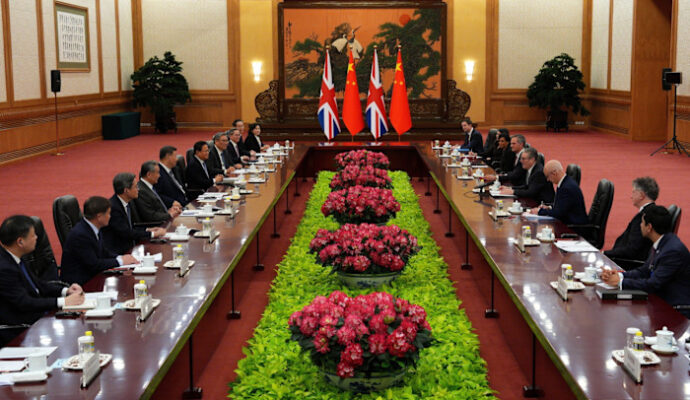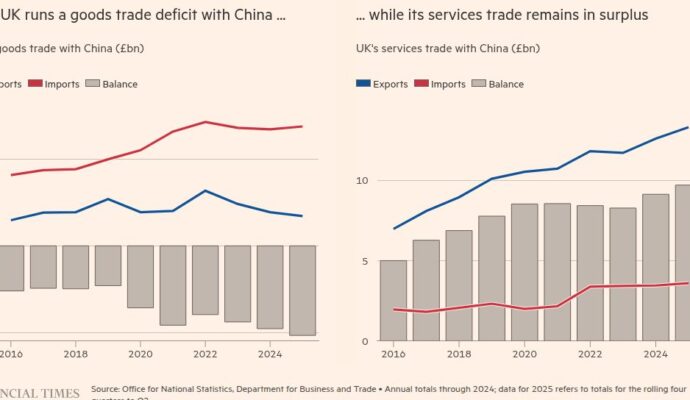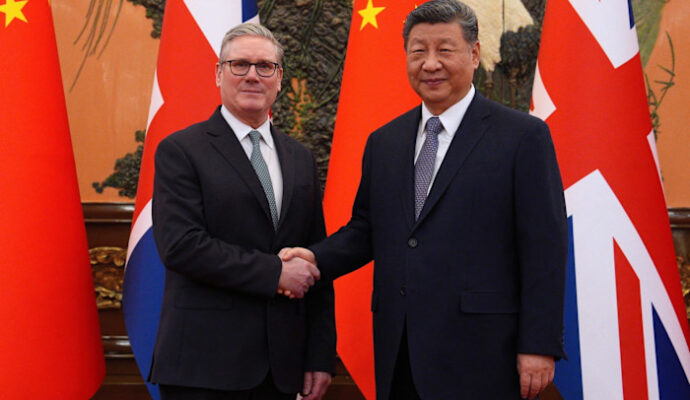Stay informed with free updates
Simply sign up to the Chinese trade myFT Digest — delivered directly to your inbox.
China has launched a sweeping probe into Mexico’s imposition of tariffs and other trade restrictions on its exports, as the global fallout from US President Donald Trump’s trade war widens.
The investigation, which was accompanied by an anti-dumping probe into Mexican pecan nut exports to China, marked one of Beijing’s most significant actions to deter third countries from co-operating with Washington’s efforts to curb Chinese trade.
China’s commerce ministry said late on Thursday that a Mexican proposal to “increase import tariffs on products from non-free trade partners such as China . . . will seriously damage the trade and investment interests of Chinese companies”.
It said Mexico’s tariffs would be investigated under a Chinese law aimed at maintaining the “foreign trade order”.
Mexico this month announced that it would slap a 50 per cent tariff on Chinese cars, part of a bill that proposed levies on about 1,400 products, from textiles to steel, that will apply to all countries with which Mexico does not have a trade deal.
The proposed Mexican tariffs on China come ahead of a scheduled review next year of the North American trade deal between the US, Mexico and Canada. Mexico, which is the world’s biggest buyer of Chinese cars, is under increasing pressure from Washington to crack down on China’s growing influence in its economy.
Mexico’s President Claudia Sheinbaum played down the geopolitical tensions, saying this month that she was not seeking a conflict with China and presenting the tariffs as designed to support domestic industry.
“We have a very good relationship with China and we want to keep having a good relationship with them,” she said.
Mexico is the US’s biggest trading partner, with more than 80 per cent of exports going to its northern neighbour. That has made it particularly vulnerable to pressure from Trump, including over immigration and border security. US officials have accused China of using Mexico as a “back door” for goods to circumvent high US tariffs.
China’s commerce ministry said its probe would cover not only the latest Mexican tariffs but also “other trade and investment restrictive measures implemented by Mexico in recent years involving China”.
Mexico has said it would set up a national security investment screening mechanism similar to the Committee on Foreign Investment in the US, a move widely seen as targeting Chinese investment for scrutiny.
Beijing, meanwhile, has limited direct leverage on Mexico through trade. Mexico exported $5.7bn worth of goods to China last year, compared with $115bn of imports from China.
A number of Mexican industries, including textiles and shoe manufacturers, have complained about unfair competition from low-cost Chinese importers.
But Beijing has shown that it can apply significant force on other countries through indirect measures, such as controls on rare earths exports, or by targeting politically sensitive industries such as pork exporters in Europe.
“The Chinese side believes that, in the current context of the US imposing excessive tariffs, all countries should jointly oppose all forms of unilateralism and protectionism, and should never sacrifice third-party interests due to coercion from others,” China’s commerce ministry said in a separate statement.
“If Mexico’s unilateral tariff increase is implemented . . . it will harm the interests of relevant trading partners, including China,” it added.
China said the pecan anti-dumping probe was being initiated over evidence that Mexico was selling the product at prices below “normal value”, “leading to a sharp increase in import volume and a decline in market prices”.
The probe is due to conclude within a year, but could be extended by another six months.
Pecans make up a small part of Mexico’s exports to China, more than 40 per cent of which are copper, minerals and concentrates, which are not covered by the latest announcement.


